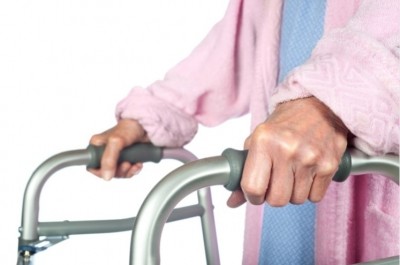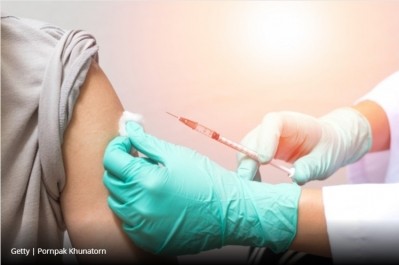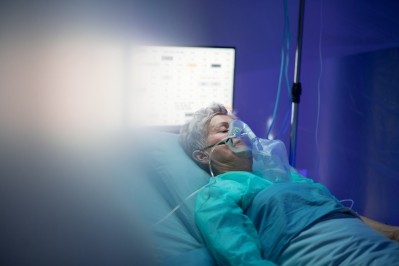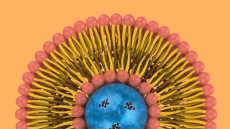Study backs link between Vitamin D and COVID-19 severity

Vitamin D deficiency is frequently reported in patients with SARS-CoV-2 infection. The aim of this study was to correlate the 25OH-Vitamin D serum concentrations with clinical parameters of lung involvement, in elderly patients hospitalised with COVID-19.
Sixty-five consecutive COVID-19 patients (mean age 76 ± 13 years) were retrospectively analysed and compared to sixty-five sex- and age-matched control subjects (CNT).
The following clinical parameters were collected: type of pulmonary involvement, respiratory parameters (PaO2, SO2, PaCO2, PaO2/FiO2), laboratory parameters (including 25OH-vitamin D, D-dimer, C-reactive protein), as well as duration of hospitalisation and duration of COVID-19 symptoms.
Results revealed that significantly lower vitamin D serum levels were found in COVID-19 patients than in CNT (median 7.9 vs 16.3 ng/mL, p = 0.001) and a statistically significant positive correlation was observed between vitamin D serum levels and PaO2 (p = 0.03), SO2 (p = 0.05), and PaO2/FiO2 (p = 0.02).
A statistically significant negative correlation was found between vitamin D serum levels and D-dimer (p = 0.04), C-reactive protein (p = 0.04) and percentage of O2 in a venturi mask (p = 0.04).
A negative correlation was also observed between vitamin D serum levels and severity of radiologic pulmonary involvement, evaluated by computed tomography: in particular, vitamin D was found significantly lower in COVID-19 patients with either multiple lung consolidations (p = 0.0001) or diffuse/severe interstitial lung involvement than in those with mild involvement (p = 0.05).
Finally, significantly lower vitamin D serum levels were found in the elderly COVID-19 patients who died during hospitalisation, compared to those who survived (median 3.0 vs 8.4 ng/mL, p = 0.046).
The researchers conclude that this study confirms that 25OH-vitamin D serum deficiency is associated with more severe lung involvement, longer disease duration and risk of death, in elderly COVID-19 patients.
The detection of low vitamin D levels also in younger COVID-19 patients with less comorbidities further suggests vitamin D deficiency as crucial risk factor at any age.
The report states that the results are likely linked to the role played by the biologically active metabolite of vitamin D [1,25(OH)2-D] that as steroid hormone is involved in the regulation of growth and differentiation of various immune cell types.
This study has some limitations including the small number of patients analysed and large data variability: for this reason the correlation coefficients are relatively small. Therefore, robustly designed randomised clinical trials including a larger number of patients are needed.
Research background
This is the latest in a deluge of studies linking vitamin D deficiency to COVID-19 severity. Researchers and health professionals are calling on the world's governments to add vitamin D supplementation to their virus fighting strategies.
Vitamin D has been associated with COVID-19 infection, in terms of higher risk of disease development, higher disease severity, higher frequency of intensive care unit hospitalisation, and higher risk of death.
The results of the current study are quite similar to those of a recent study reporting vitamin D serum levels < 50 nmol/L (< 20 ng/mL) in 61% of hospitalized patients (mean age 76 years). They observed a significantly greater prevalence of vitamin D deficiency (< 50 nmol/L) in patients requiring intensive care treatment than in those without (81% of patients).
Similarly, another study reported 25OHD deficiency in 67% of patients with mild SARS-CoV-2 disease, but in 80% of patients requiring mechanical ventilation.
A recent systematic review analyzed seven studies on COVID-19 severity, intensive care treatment, and mortality (1368 patients were included) and detected a mean vitamin D level of 22.9 nmol/L (9.16 ng/mL), higher but similar to that of our cohort of patients (7.9 ng/mL). Patients with good prognosis had significantly higher vitamin D levels compared with those with poor prognosis.
A low PaO2/FiO2 ratio was detected as an independent risk factor for death in COVID-19 patients. Our study detected a statistically significant positive correlation between 25OHD serum levels and PaO2/FiO2 values. This observation is in line with the results of another study reporting a high prevalence of hypovitaminosis D in COVID-19 patients with low PaO2/FiO2 ratio.
How vitamin D interferes with COVID-19 progression is not completely understood but this report aims to elucidate some pathways.
"1,25(OH)2-D plays an anti-viral role, regulating the inflammatory response by modulating toll-like receptor expression and NK cell function, and suppressing over-expression of pro-inflammatory cytokines. 1,25(OH)2-D enhances the defense also by inducing antimicrobial peptide release, like cathelicidin that lead to viral destruction and clearance and facilitates the recruitment of monocytes, macrophages, neutrophils and dendritic cells.
"Therefore, 1,25(OH)2-D may regulate the innate/adaptive responses and may interfere with the maturation of dendritic cells and their ability to present antigen to T-cells, shifting the T cell profile from the pro-inflammatory Th1 and Th17 subsets to Th2 and Treg subsets, thus inhibiting the pro-inflammatory processes.
"Besides the immunomodulatory and anti-viral effects, 1,25(OH)2-D modulates the renin–angiotensin system that also plays a pivotal role in the pathogenesis of COVID-19. ACE2 seems the main host cell receptor that mediates the infection by SARS-CoV-2: the virus attaches to ACE2 through its spike glycoprotein to enter the cell, thus reducing the expression of ACE2.
"Vitamin D suppresses renin at the transcriptional level and consequently angiotensin expression, and increases ACE2 expression, possibly restoring the physiological concentration of ACE2 downregulated by the virus.
"In the lung, several alveolar cell types express the ACE2 receptor. These cells play an important role in producing surfactant, able to regulate the alveolar surface tension. SARS-CoV-2 can infect the alveolar cells by ACE2 binding and suppress the production of surfactant. The loss of alveolar cells results in lung damage and respiratory insufficiency due to the loss of pulmonary surfactant. This damage might be prevented by vitamin D.
"Interestingly...vitamin D deficiency is associated with a higher risk of thrombotic events. As known, patients with COVID-19 frequently suffer from microthrombotic complications, which may contribute to worse lung disease and death. The main autopsy histological findings report a sequential alveolar damage, mainly characterized by focal capillary microthrombosis."
Source: Nutrients
Cutolo. M., et al
"Vitamin D and Lung Outcomes in Elderly COVID-19 Patients"
https://doi.org/10.3390/nu13030717















